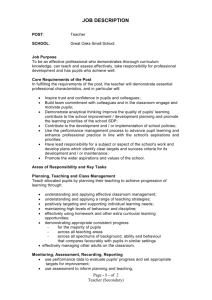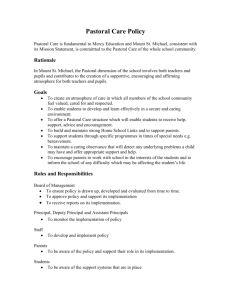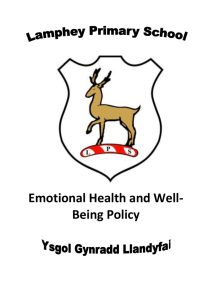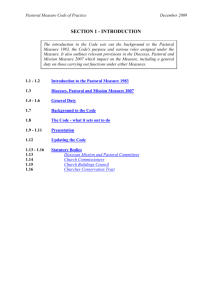Tenby Junior Community School
advertisement
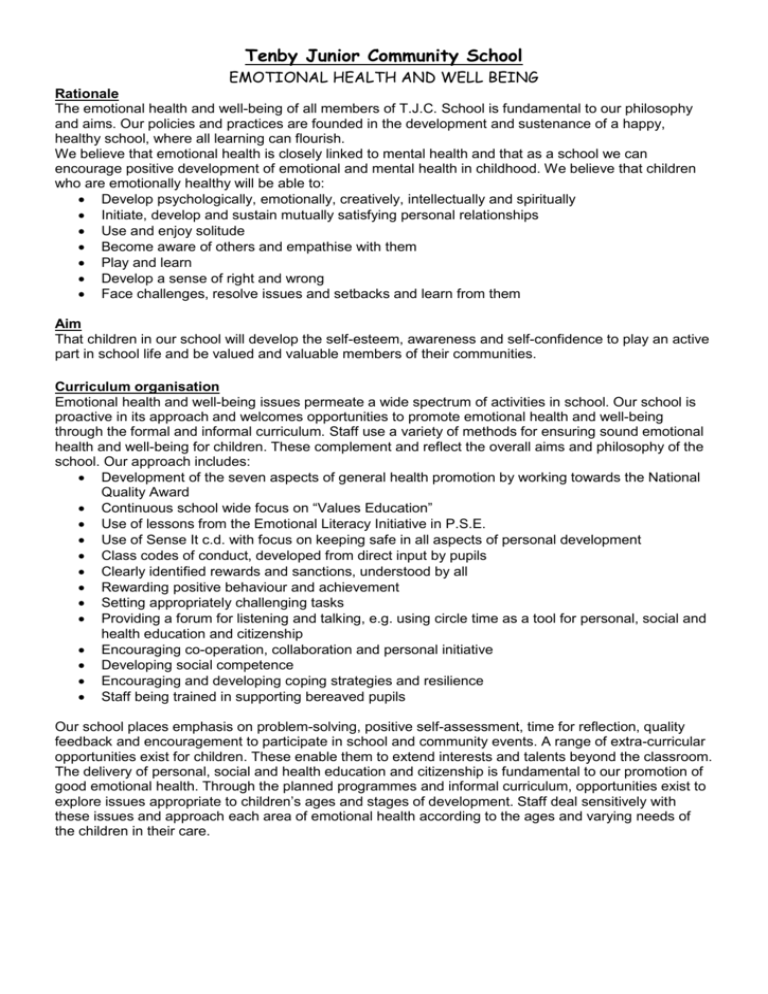
Tenby Junior Community School EMOTIONAL HEALTH AND WELL BEING Rationale The emotional health and well-being of all members of T.J.C. School is fundamental to our philosophy and aims. Our policies and practices are founded in the development and sustenance of a happy, healthy school, where all learning can flourish. We believe that emotional health is closely linked to mental health and that as a school we can encourage positive development of emotional and mental health in childhood. We believe that children who are emotionally healthy will be able to: Develop psychologically, emotionally, creatively, intellectually and spiritually Initiate, develop and sustain mutually satisfying personal relationships Use and enjoy solitude Become aware of others and empathise with them Play and learn Develop a sense of right and wrong Face challenges, resolve issues and setbacks and learn from them Aim That children in our school will develop the self-esteem, awareness and self-confidence to play an active part in school life and be valued and valuable members of their communities. Curriculum organisation Emotional health and well-being issues permeate a wide spectrum of activities in school. Our school is proactive in its approach and welcomes opportunities to promote emotional health and well-being through the formal and informal curriculum. Staff use a variety of methods for ensuring sound emotional health and well-being for children. These complement and reflect the overall aims and philosophy of the school. Our approach includes: Development of the seven aspects of general health promotion by working towards the National Quality Award Continuous school wide focus on “Values Education” Use of lessons from the Emotional Literacy Initiative in P.S.E. Use of Sense It c.d. with focus on keeping safe in all aspects of personal development Class codes of conduct, developed from direct input by pupils Clearly identified rewards and sanctions, understood by all Rewarding positive behaviour and achievement Setting appropriately challenging tasks Providing a forum for listening and talking, e.g. using circle time as a tool for personal, social and health education and citizenship Encouraging co-operation, collaboration and personal initiative Developing social competence Encouraging and developing coping strategies and resilience Staff being trained in supporting bereaved pupils Our school places emphasis on problem-solving, positive self-assessment, time for reflection, quality feedback and encouragement to participate in school and community events. A range of extra-curricular opportunities exist for children. These enable them to extend interests and talents beyond the classroom. The delivery of personal, social and health education and citizenship is fundamental to our promotion of good emotional health. Through the planned programmes and informal curriculum, opportunities exist to explore issues appropriate to children’s ages and stages of development. Staff deal sensitively with these issues and approach each area of emotional health according to the ages and varying needs of the children in their care. Children are grouped in a variety of ways to promote their highest levels of achievement in all areas of the curriculum. In the classroom, there are opportunities for children to work in both friendship and ability groups, including setting arrangements for literacy and numeracy. Regular review of setting arrangements helps to ensure that children gain maximum benefit. We see parental involvement as a vital part of emotional well being. Regular opportunities exist to promote partnership with parents, including: Meet the teacher evening in September- a chance to find out about the organisation, pastoral care and curriculum in each year group Parents’ Evenings in the Spring Term Weekly homework opportunities in which parents are encouraged to support specific tasks, i.e. research and wider reading associated with the I.P.C. curriculum Regular news letters informing parents and carers of planned activities and events A school web site, regularly updated Involvement in individual education plans and reviews for children with additional educational needs. Presentations by staff and partner organisations from the community in relation to specific areas of concern e.g. Internet Safety, Substance Use and Misuse Inclusion All curriculum policies make reference to inclusion, which is key to our school ethos. Curriculum provision is based on an understanding that we may need to cater differently for individuals in order to provide equality of opportunity. This approach to equal opportunities is extended to all members of our school community and included in our Equal Opportunities and Race Equality Policies. Pastoral organisation for pupils We pride ourselves on a whole school, team approach which is integral to our way of working at Tenby Junior School. Our methods include: Recognising and responding positively to a child’s emotional and/or behavioural needs Communicating with parents positively and realistically to create a partnership approach to children’s emotional health and well-being Liaising with appropriate agencies to enlist advice and/or support e.g. school nurse, Education Welfare Officer The Head Teacher receiving weekly notes relating to pastoral issues from every class teacher Clear policies for Positive Behaviour, Child Protection, Anti-Bullying and Attendance are promoted in school. These provide further guidelines for promoting emotional health and well-being. Alongside our policies are a range of practices to promote emotional health and well-being. Peer mentoring, with a Buddy system Transition projects in collaboration with Tenby Infant School to support pupils moving from Year 2 Transition projects with Greenhill School and Ysgol Preseli to support our pupils moving on to secondary education A School Council with elected membership from all classes Class Councils in each class Year 6 pupils involved in the School Ambassador scheme Celebration assemblies in which individual success is highlighted and congratulated A whole school system of rewards for individuals through the House Point system Pupil of the week certificates Healthy lunch box certificates (for both pupils and parents) Attendance certificates The school is proud to have passed phases one, two, three, four and five of the Pembs. Healthy Schools Scheme and is now working towards the W.A.G. National Quality Award. We have also been successful in the Bronze level of the Sustainable Schools scheme. Pastoral organisation for staff Pastoral support for all members of the school community is fundamental to the aims and philosophy of our school. We believe that well-supported, valued members of staff are best placed to provide emotional well-being for children in their care. Our performance management structure promotes personal and professional support, alongside the range of agencies which can be accessed, should the need arise. We follow county guidelines and policies for supporting personnel, including those for harassment, anti-bullying, race equality and managing staff absence. A clear system of line management exists to monitor and support staff needs. Monitoring and evaluation Provision across the school is monitored by the Head Teacher and named governor. The Head Teacher will provide support and advice to members of our school community about the provision and implementation of pastoral care in school. Weekly staff meetings, regular meetings of the Senior Management Team and termly meetings of the school Governing Body provide suitable opportunities for the quality of care to be evaluated and developed. This policy will be reviewed each year or in light of new legislation regarding child welfare.


![afl_mat[1]](http://s2.studylib.net/store/data/005387843_1-8371eaaba182de7da429cb4369cd28fc-300x300.png)
